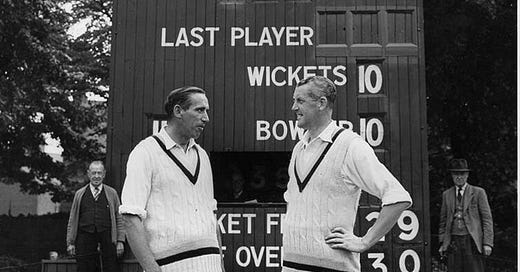20th December, 1948
In a heavily apartheid Durban, a test match was being played between England and South Africa. In the field was Clifford Gladwin. tall right-arm medium-fast seam bowler of great accuracy and consistency, Gladwin formed, with Les Jackson, the most feared new ball attack in the English first-class game for a dozen years after World War II. Gladwin was both penetrative and mean, with around a third of his overs being maidens, and in thirteen full seasons, he took 100 or more wickets twelve times, usually at an average of under 20 runs per wicket.
Cricket writer, Colin Bateman noted that "Gladwin was so proud of his miserly bowling, that he would correct the scorers at the close of play if there was an error in their figures"
But on that day, it was not his bowling prowess that mattered. When he arrived at the crease, his team needed 12 runs in 3 overs with 2 wickets remaining. It was the era when bowlers paid as much attention to their batting skills as a well-fed, sleepy cat pays to its cuddle-desiring owners. Legend has it that ‘Cometh the hour, Cometh the man’ was the internal monologue running in Galdwin’s head as he took guard.
On that day, Clifford Galdwin became a national hero. On the last ball of the test match, he ran a leg bye as England made it past the finish line. To this day, it remains the only one of the two last-ball victories in the history of Test matches.
But there is another part of Clifford Galdwin’s life that is often not written about.
Galdwin played for Derbyshire, much like his father Joseph Galdwin. By the 1949 season, just a few months after the legendary win against South Africa in Durban, Gladwin had developed so much as a batsman that he made 124 against Nottinghamshire and scored over 900 runs. And he also played in an era of English cricket, when most counties relied on spin. His home team of Derbyshire often came up short in the spin department. So Gladwin would roll his arm over and bowl off-breaks as and when needed.
Cometh the hour, Cometh the wo(man)
But what if I were to flip this and ask - Does the man arrive when the need of the hour is the greatest or does the opportune hour arrive when the man is ready? Did we start The 6% Club because the time was ripe for it, or did the idea of The 6% Club come to us because we were ready?
While this question is perhaps hard to answer, maybe the takeaway for us is that as we run The 6% Club or as one starts anything from scratch, we will need to be Clifford Galdwin, the miserly pace bowler. We will need to be Clifford Gladwin, the bowler turned batsman who hit a century. We will need to be Clifford Gladwin, the man who rolled his arm and got wickets with off breaks. And sometimes we will need to be all the Clifford Galdwins together.
The truth is, that for the biggest, scariest and most daunting projects we want to undertake, we are never ready. No combination of time, skill, experience, money and circumstance is ever ideal or required to get started.
Changing a career, check.
Becoming a parent, check.
Starting a company, check.
Putting your ideas, thoughts and work out there, triple-check.
Maybe the idea behind Cometh the hour, Cometh the wo(man) is not to ruminate over what comes first. The idea is to be Clifford Gladwin.
If you are new here, I am Utsav, who spends an unnecessary amount of his time thinking about content, travel and the struggles of being a millennial. As a creator, I have built a global top 2% podcast Postcards from Nowhere, and I run The 6% Club - India’s first creator coaching program, designed for people with full-time jobs. We take you from idea to launch in 45 days.




